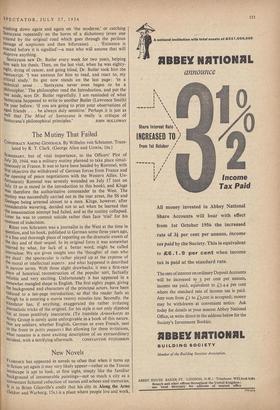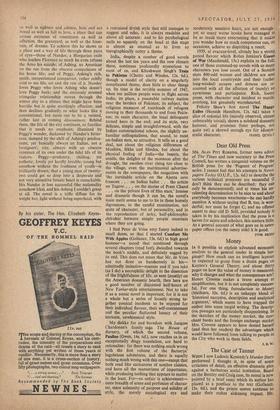New Novels
,LoRENcE has appeared in novels so often that when it turns up in fiction yet again it may very likely appear—rather as the Tuscan landscape is apt to look, at first sight, simply like the familiar background of innumerable paintings—not so much a city as a convenient fictional collection of names and echoes and memories. It is to Brian Glanville's credit that his city in Along the Arno (Seeker and Warburg, 15s.) is a place where people live and work, as well as sightsce and admire, hate and are bored as well as fall in love, a place that can arouse extremes of resentment as well as affection, the graveyard, as well as the foun- tain, of dreams. To achieve this he shows us .a place and a Way of life through three pairs of eyes—those of Nandor, a Hungarian exile who loathes Florence so much he even refuses the Arno his suicide; of Ashing, an American on the run from the obscure compulsions of his home life; and of Peggy, Ashing's rich, spoilt, inexperienced compatriot, rather coldly avid to see life, art and the rest of it. Nandor loves Peggy who loves Ashing who doesn't love Peggy back; and the curiously stressed triangular relationship moves through the winter city to a climax that might have been horrific but is quite startlingly effective; and then declines gradually to what looks like a conventional, but turns out to be a twisted, rather late in coming denouement. Behind them, the life of the city continues, so familiar that it needs no emphasis; illumined by Peggy's wonder, darkened by Nandor's bitter- ness, damped by the chill of Ashing's predica- ment, yet basically always an Italian, not a foreigners', city, always with an obscure existence of its own under the tidal life of its visitors. Peggy—predatory, chilling, yet pathetic; lovely yet hardly lovable,. young but somehow without the freshness of youth—is brilliantly drawn; that a young man of twenty- two could get so deep into a desperate and not very attractive female heart is remarkable. His Nandor is less successful (the nationality somehow irks), and his Ashing I couldn't grasp at all. The novel is a trifle diffuse for its weight but, light without being superficial, with
a restrained dryish style that still manages to suggest and echo, it is always readable and above all accurate: and to hit psychological nails so squarely on the head at this stage is almost as unusual as to liven so topographically corny a theme.
India, despite a number of good novels about the last ten years and the new climate there, continues profoundly mysterious to most of us, and Khushwant Singh's Train to Pakistan (Chatto and Windus, 12s. 6d.), though a model of clarity on a singularly complicated theme, does little to clear things up. Its time is the terrible summer of 1947, when ten million people were in flight across India; its place, a peaceable railway station near the borders of Pakistan; its subject, the religious massacre of trainloads of refugees moving in their thousands to and from Pakis- tan; its main character, the local delinquent turned hero in the end; and its style, very delicate, simple and straightforward, with the Indian conversational echoes, the slightly un- familiar colloquialisms, that sound, to most un-Indian ears, so attractive. It tells us a good deal, not about the religious differences of Muslims, Sikhs and Hindus, but about the physical feeling of India—the insects, the smells, the delights of the monsoon after the drought, the swollen river rising too close to the village, even the matrimonial 'advertise- ments in the newspapers, the magazines with 'the inevitable article on the Ajanta cave frescoes . . . on Indian ballet . . . the article on Tagore . . . on the stories of Prem Chand . . . on the private lives of film stars.' Intense and dramatic though it can be, the novel's main merit seems to me to lie in these homely digressions, in the candid examination, not quite of character, but of personality, and in the reproduction of jerky, half-philosophic chit-chat between simple people uncertain where they are going.
I find Peter de Vries very funny indeed in small doses, so that I started Comfort Me With Apples (Gollancz, 13s. 6d.) in high good humour—a mood that continued through several chapters (read fast), dwindled towards the book's middle, and definitely sagged by its end. This does not mean that Mr. de Vries has not done us handsomely in his— admittedly imitative—manner and if you take (as I do) a necrophilie delight in the dissection of the frightfulness of life, as seen (mostly) on the American domestic hearth, then here are a good number of disjointed half-hours of New Yorker-style entertainment. Not to take it as a comic novel is important, for it is not a whole but a series of loosely strung to- gether comical incidents to be enjoyed for their individual flavour, their self-containment and the peculiar flatfooted lunacy of their intricate, unwhimsical style.
My dislike for and boredom with Jacques Chardonne's family saga The House of liarnery, of which the second volume, Pauline (Owen, 14s. 6d.), now reaches us in an exceptionally dingy translation, are hard to rationalise: for there was nothing much wrong with the first volume of the Barnerys' lugubrious adventures, and there is equally nothing much wrong with this one—except that both read like caricatures of sombre classics, and have all the mannerisms of importance, while producing nothing that appears to matter in the least. For—so unfair is achievement— mere breadth of scene and profusion of charac- ter, mere solemnity of purpose and solidity of style, the merely sociological eye and
moderately sensitive heart, are not enough: yet so many worse books have managed to be so much more entertaining that it makes you wonder how so much competence can, on occasions, achieve so dispiriting a result.
1939, at evacuee-level, already has a strong period flavour which Robin Jenkins's Guests of War (Macdonald, 15s.) exploits to the full; one of those crammed-up novels with so manY characters you lose count. Out of a Scottish slum 800-odd women and children are sent into the local countryside and their (rather long-winded) scrapes and dreams are re- counted with all the affection of (surely) al/ eyewitness and participator. Rich, loamy prose, with character and incident to match; overlong, but genuinely warmhearted.
Felicity Shaw's first novel The HWY Exiles (Harnish Hamilton, 12s. 6d.) takes a slice of colonial life (naively observed, almost unbearably trivial), shows a subdued domestic humour, and promises (later perhaps, not quite yet) a shrewd enough eye for idiosyn-



































 Previous page
Previous page